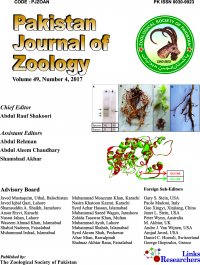Thymoquinone Improves Lead-Induced Hematotoxicity in Rats
Thymoquinone Improves Lead-Induced Hematotoxicity in Rats
Aymen Mabrouk*
ABSTRACT
The protective role of thymoquinone (TQ), the major active ingredient of volatile oil of Nigella sativa seeds, against the deterioration of blood indices by lead (Pb) has never been studied. Therefore, the present study was carried out to evaluate the possible beneficial effect of TQ against Pb-induced hematological changes. Adult male Wistar rats were treated with Pb (2000 ppm of Pb acetate in drinking water) and/or TQ (5 mg/kg/day, per os) for five weeks. Results obtained clearly showed that Pb intoxication significantly decreased the mean red blood cells, hemoglobin, hematocrit and platelets values, but significantly increased the white blood cells count. Interestingly, co-administration of TQ to the metal-treated animals corrected all the altered hematological parameters except platelets level. In conclusion, TQ can be considered for the first time as a promising therapeutic agent against Pb-induced hematotoxicity.
To share on other social networks, click on any share button. What are these?










